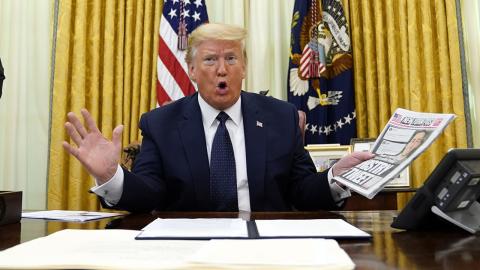<p></p>
<p>In response to ongoing protests and rioting in Minneapolis after the death of a black man at the hands of a white police officer, President Trump sent out a Twitter message that copied a controversial term used during similar riots in Miami in 1967.</p>
<p>Trump’s message criticized the rioters as “THUGS” and said he told Minnesota Governor Tim Walz that “”.</p>
<p>Then Trump added, “<em>Any difficulty and we will assume control but, when the looting starts, the shooting starts. Thank you!</em>”</p>
<p>That exact same sentence “<em>when the looting starts the shooting starts</em>” was first used in 1967 by Miami’s then-Police Chief Walter Headley in reference to protests and black-empowerment rallies organized in response to Miami’s aggressive policing of black neighborhoods, stop-and-frisk policies, and the Police Chief’s ”get tough” crime-fighting tactics.</p>
<p>Headley, a former Army soldier, said he had instructed his officers to use shotguns and dogs to “<em>cut crimes in the city’s slums</em>“. Chief Headley also ended community-relations programs because he didn’t think they worked.</p>
<p>“We haven’t had any serious problems with civil uprisings and looting because I’ve let the word filter down that when the looting starts, the shooting starts,” Headley said during a 1967 interview with the Miami Herald newspaper.</p>
<p>Headley also told the Herald that <span style="font-size: 1rem; -webkit-tap-highlight-color: transparent; -webkit-text-size-adjust: 100%;">his “get tough” policy was primarily aimed at young “Negro males from 15 to 21”.</span></p>
<p>“Felons will learn that they can’t be bonded out from the morgue,” Headley said. “We don’t mind being accused of police brutality. They haven’t seen anything yet.”</p>
<p>The same “<em>looting/shooting</em>” phrase was used in 1968 by Alabama Governor George Wallace during his presidential campaign.</p>
<p>Wallace, a pro-Segregation conservative Democrat that opposed racial integration at the University of Alabama in 1963 until President Kennedy called in the National Guard, also used another similar phrase at a campaign rally in 1968.</p>
<p>‘“We don’t have riots in Alabama,” Wallace said at the time. “They start a riot down there, first one of ’em to pick up a brick gets a bullet in the brain, that’s all.”</p>
<p>Trump quickly tweeted a clarification to his message on Friday explaining that he was referring to bystanders that were shot by protesters both in Minneapolis and in Louisville, Kentucky.</p>
<p>“Looting leads to shooting, and that’s why a man was shot and killed in Minneapolis on Wednesday night – or look at what just happened in Louisville with 7 people shot. I don’t want this to happen, and that’s what the expression put out last night means,” Trump tweeted in defense of his prior message.</p>
<p>Others have disputed Trump’s attempt to clarify his message by pointing out that his original message directly connected the military “taking control” with “the shooting starts.”</p>
<p>The Reverend Al Sharpton, a longtime civil rights advocate, said that phrase was “always used about civil rights protesters.”</p>
<p>“I don’t know if the history of it was in his head or someone around him said it and he liked the sound of it,” Rev. Sharpton said. “But it’s certainly in his spirit, and it poisons an already volatile situation.”</p>
<p>In response to the President’s posting, Twitter flagged his message and added a Public Service Notice at the top stating that the tweet violated its rules about glorifying violence but that the company thought it was still important for the public to have access to the message. The message is still viewable and can be retweeted with a comment, but users cannot like, reply to, or retweet it.</p>
<p>“This Tweet violated the Twitter Rules about glorifying violence. However, Twitter has determined that it may be in the public’s interest for the Tweet to remain accessible,” the Public Service Notice read.</p>
<p>Twitter had placed a fact-checking link to another one of President Trump’s tweet earlier this week when he posted a message claiming mail-in ballots would lead to wide-spread fraud.</p>
<p>Angry with what he viewed as “censoring” his free speech, Trump signed an Executive Order on Thursday that would allow the Federal Communications Commission (FCC) to review existing protections under section 230 of the Communications Decency Act which limits the legal liability of social media companies for contents others post on their online platforms, distinguishing the sites from publishers of the material.</p>
<p>Legal experts predict the order will not have much effect on social media companies but is viewed more as a political move by Trump in response to the perceived censoring of his messages.</p>
Image
Image

Category